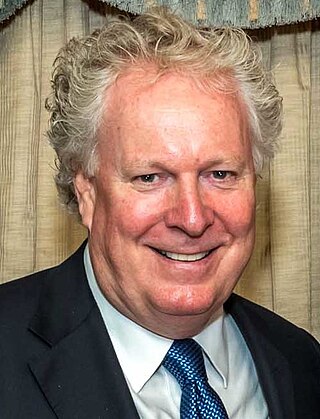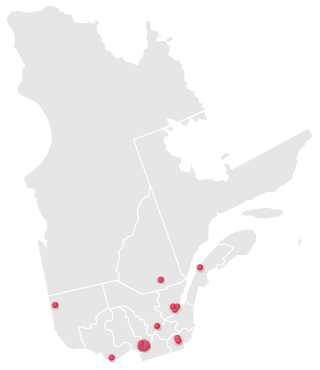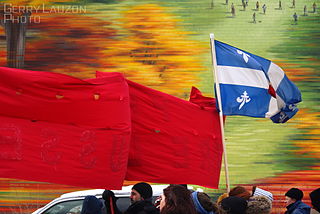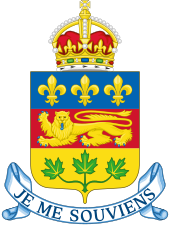Education in Quebec is governed by the Ministry of Education and Higher Education. It was administered at the local level by publicly elected French and English school boards, changed in 2020 to school service centres. Teachers are represented by province-wide unions that negotiate province-wide working conditions with local boards and the provincial government of Quebec.
Section 33 of the Canadian Charter of Rights and Freedoms is part of the Constitution of Canada. It is commonly known as the notwithstanding clause. Sometimes referred to as the override power, it allows Parliament or provincial legislatures to temporarily override sections 2 and 7–15 of the Charter.

The Université du Québec is a system of ten provincially-run public universities in Quebec, Canada. Its headquarters are in Quebec City. The university coordinates 1400 programs for over 100,000 students. The government of Quebec founded the Université du Québec, a network of universities in several Quebec cities. In a similar fashion to other Canadian provinces, all universities in Quebec have since become public.

John James "Jean" Charest is a Canadian lawyer and former politician who served as the 29th premier of Quebec from 2003 to 2012. Prior to that, he was a member of Parliament (MP) between 1984 and 1998. After holding several Cabinet posts from 1986 to 1990 and from 1991 to 1993, he was the leader of the Progressive Conservative Party of Canada from 1993 to 1998.

This section of the Timeline of Quebec history concerns the events between patriation of the British North America Act and the present day.

Jean-Marc Fournier is a Quebec politician and a lawyer. He represented the riding of Saint-Laurent in the National Assembly of Quebec from 2010 to 2018, and previously represented the riding of Châteauguay from 1994 to 2008. He served as the Minister of Revenue, Government House Leader, Minister of Education, Minister of Municipal Affairs, and Attorney General in the Government of Jean Charest and was the interim leader of the Quebec Liberal Party from 2012 to 2013

Pauline Marois is a retired Canadian politician, who served as the 30th premier of Quebec from 2012 to 2014. Marois had been a member of the National Assembly in various ridings since 1981 as a member of the Parti Québécois (PQ), serving as party leader from 2007 to 2014. She is the first female premier of Quebec.
The Murray-Hill riot, also known as Montreal's night of terror, was the culmination of 16 hours of unrest in Montreal, Quebec during a strike by the Montreal police on 7 October 1969.
The California Bureau for Private Postsecondary and Vocational Education (BPPVE) was a unit of the California Department of Consumer Affairs whose purpose was to protect students by establishing academic standards for private institutions of higher education in California. BPPVE approval or exemption was required by the State of California to ensure consumer safety from fraudulent or substandard education providers. The agency ceased operation on July 1, 2007, when the legislative authority for its creation expired. A new agency, the California Bureau for Private Postsecondary Education, took its place on January 1, 2010.

François Legault is a Canadian politician serving as the 32nd premier of Quebec since 2018. A founding member of the Coalition Avenir Québec (CAQ), he has led the party since it began in 2011. Legault sits as a member of the National Assembly (MNA) for the Lanaudière region riding of L'Assomption. Legault's ongoing tenure of 5 years, 330 days, as premier is the ninth-longest in Quebec history.

Line Beauchamp is a Canadian politician. She served as the Liberal Member of the National Assembly (MNA) for the Sauvé riding, and for Bourassa-Sauvé at the Quebec National Assembly from November 30, 1998 to May 14, 2012. She also served as Minister of Culture and Communications from April 29, 2003 to April 18, 2007, Minister of Sustainable Development, Environment and Parks from April 18, 2007 to August 12, 2012, and served as Minister of Education, Recreation, and Sports from August 11, 2010, and as Deputy Premier of Quebec from September 7, 2011, until she resigned on May 14, 2012 as a result of the 2012 Quebec student strike.
Michelle Courchesne is a former Deputy Premier of Quebec. A member of the Quebec Liberal Party, she was the National Assembly Member for the riding of Fabre in Laval, Quebec. She is also the former President of the Treasury Board, Minister responsible for the Laval region, Minister of Education and Deputy Premier of Quebec. She is a former Minister of Family, Immigration, Employment and Social Solidarity.
Pierre Reid was a Canadian politician and educator in the province of Quebec. He served in the National Assembly of Quebec from 2003 to 2018, representing Orford as a member of the Quebec Liberal Party. Reid was a former cabinet minister in Jean Charest's government.

Higher education in Quebec differs from the education system of other provinces in Canada. Instead of entering university or college directly from high school, students in Quebec leave secondary school after Grade 11, and enter post-secondary studies at the college level, as a prerequisite to university. Although both public colleges (CEGEPs) and private colleges exist, both are colloquially termed CEGEPs. This level of post-secondary education allows students to choose either a vocational path or a more academic path.
Antisemitism in Canada is the manifestation of hostility, prejudice or discrimination against the Canadian Jewish people or Judaism as a religious, ethnic or racial group. This form of racism has affected Jews since Canada's Jewish community was established in the 18th century.

The 2012 Canadian Grand Prix was a Formula One motor race that took place on 10 June 2012 at the Circuit Gilles Villeneuve in Montreal, Quebec, Canada. The 70-lap race was the seventh round of the 2012 Formula One season, and the first of two North American rounds. It was the 49th Canadian Grand Prix, and the 33rd to be held at the circuit since its début on the calendar in 1978.

The 2012 Quebec student protests (movement) were a series of student protests led by students individually such as the Association pour une solidarité syndicale étudiante (ASSÉ), the Fédération étudiante universitaire du Québec, and the Fédération étudiante collégiale du Québec against a proposal by the Quebec Cabinet, headed by Liberal Premier Jean Charest, to raise university tuition from $2,168 to $3,793 between 2012 and 2018. As part of the protest movement, a series of widespread student strikes were organized, involving half of Quebec's student population by April 2012. A third of Québécois students continued to participate in the strike by its 100th day, while a quarter million had participated during its peak. Other students continued to attend their courses.
The Association pour une solidarité syndicale étudiante (ASSÉ) was a Canadian student union founded in February 2001 in Sherbrooke, Quebec, which contained about 56,000 CEGEP and university-level students in 34 member student unions throughout Quebec. The ASSÉ positioned itself distinctly from the other province-wide student unions, the Fédération étudiante universitaire du Québec (FEUQ), the Fédération étudiante collégiale du Québec (FECQ) and the Table de concertation étudiante du Québec (TaCEQ), namely rejecting hierarchical leadership structures in favor of autonomous and horizontal approaches.

Gabriel Nadeau-Dubois is a politician from Canada. He is the co-spokesperson of the left-wing party Québec solidaire since May 21, 2017, and was elected as a member of the provincial legislative assembly on May 29, 2017. Before his arrival in active politics, he was well known for his role during the 2012 Quebec student protests as co-spokesperson of the Coalition large de l'Association pour une solidarité syndicale étudiante (CLASSE), a broad coalition of student associations opposed to the $1,625 tuition hike introduced by Jean Charest's government. He quit that position on August 9, 2012.

The Quebec protests of 2015–2016 is a protest movement that began on March 21, 2015 in Quebec, in the context of what some student associations, left-wing groups, columnists qualify as social strikes, to denounce the budget restriction measures adopted by the Philippe Couillard government. 130,000 students are on strike during the first national demonstration on April 2, 2015, including 55,000 on general strike. Like the 2012 Quebec student protests, the movement was initiated by students and encompassed various issues, particularly that of public finances.















